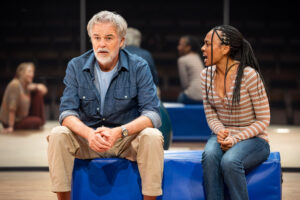Wharf 1 Theatre, July 17
7/10
Annie Baker can make a play out of minimal words and minuscule gestures. The effect borders on shock because we’re so used to huge emotions with titanic consequences. You have to readjust; put your antennae on higher alert.
Baker wrote two of this century’s best plays: The Aliens and, above all, The Flick, about the death throes of a cinema. If Circle Mirror Transformation isn’t in that league, it’s because her sheer daring doesn’t always succeed.

On the page, the play sometimes presents the merest sketches of the characters, and at other times she exercises infinite precision about what happens and, most particularly, what doesn’t happen. If the spaces between notes define a rhythm, the spaces between words or events can define the feel as well as the pace of a play. Just as Beckett famously used a metronome when directing a Happy Days production, so one can imagine Baker writing Circle Mirror Transformation with a stopwatch by her side.
The setting is a weekly adult acting class in a Vermont community centre, run by Marty, admirably played by Rebecca Gibney after a 20-year hiatus from the stage. Marty doesn’t use texts, but rather games and improvisations. Her four students are James, her husband (Cameron Daddo), Schultz, a recently divorced carpenter (Nicholas Brown), Theresa, an ex-actor (Jessie Lawrence), and high school student and wannabe actor Lauren (Ahunim Abebe).
We come to know them by the way they engage – or don’t – with Marty’s games, and by how they interact before, during and after these sessions. Baker manages to squeeze fulfilled and unfulfilled romances into her scenario, but they are merely cross-hatched; we do the colouring in.

Poor Lauren was hoping to do some “real” acting before auditioning for a West Side Story production, and she speaks for us when she doesn’t “get” some of the perverse and even irritating games. It’s in the repetition of these that Baker dares us to stay on board, the experience being akin one of those elaborate jokes where you pray the pay-off is worth the wait.
For me, she stretched our patience. In this Sydney Theatre Company production directed by Dean Bryant, the casting and acting are largely on point, with Gibney and Daddo bringing an easy charisma to bear that suits their likeable characters. Schultz and Lauren suck us in, too, with Abebe’s portrayal of the latter replete with her toes pinching each other as she initially feels excruciating discomfort in participating (just as Gibney beautifully “conducts” her exercises with tiny hand gestures). Theresa is the least interesting character, and Lawrence does well to keep us engaged.
If you want to see a play contrived almost out of thin air; a play with warmth, humour and a perfect capturing of our stuttering attempts at real communication, this is it. Yet you leave with a nagging sense that a deeper emotional impact went begging.
Until September 7.